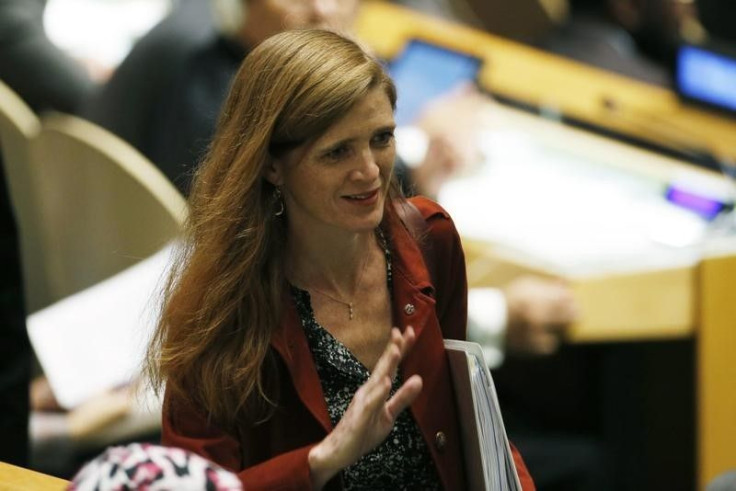US Envoy In West Africa To See How World Failing In Ebola Fight

CONAKRY (Reuters) - The U.S. Ambassador to the United Nations, Samantha Power, arrived in Guinea's capital Conakry on Sunday to see first hand how the global response is failing to stop the deadly spread of Ebola in West Africa.
Power, who will also visit Sierra Leone and Liberia, said
she hopes to gain a better understanding of which resources are missing so she can push other countries to offer more help.
The three West African countries are bearing the brunt of the worst outbreak of the hemorrhagic fever on record that the World Health Organization (WHO) says has killed nearly 5,000 people. A small number of cases have also been reported in Mali, Nigeria, Senegal, Spain and the United States.
"We are not on track right now to bend the curve," Power told Reuters. "I will take what I know and I learn and obviously provide it to President Obama, who's got world leaders now on speed dial on this issue."
"Hopefully the more specific we can be in terms of what the requirements are and what other countries could usefully do, the more resources we can attract," she said.
The United Nations said last month almost $1 billion was needed to fight Ebola for the next six months. According to the U.N. Financial Tracking Service, nearly $500 million has been committed and a further $280 million in non-binding pledges made.
"As we have seen, along with Spain, it is not a virus that is going to remain contained within these three effected countries if we don't deal with it at its source," Power said.
Aid groups on the ground say that what is needed are more doctors, nurses and treatment centers. Ebola patients are being turned away when there are not enough beds and usually cared for at home, where they risk infecting more people, aid workers say.
BED, MEDICAL STAFF SHORTAGES
According to the Africa Governance Initiative (AGI), even if existing international commitments are met by December, there could be a shortage of over 6,000 beds across Sierra Leone and Guinea.
Nearly half of the beds currently planned in the three countries will lack the medical staff needed to support them, a study by former British prime minister Tony Blair's London-based development consultancy found.
AGI based its projections on the WHO's worst-case scenario, which foresees 10,000 new cases per week in December.
"The international community badly misjudged the impact of the Ebola epidemic in its first few months and is compounding that error by failing to act quickly enough now," AGI's chief executive Nick Thompson said.
He called upon more countries to follow the examples of the United States, Britain and Cuba, which have deployed military and medical personnel to the region to bolster efforts to stop the epidemic at its source.
"We're just running behind the train and the train goes way faster than we're reacting," Susana Santos, country director in Guinea for the Spanish chapter of aid organization Action Against Hunger, told Power during a meeting on Sunday.
"There's a need for everyone to step up, and step up faster," she said
Some Republican lawmakers have called for a travel ban on the worst affected countries after four cases of Ebola were diagnosed in the United States.
Obama has resisted such a move on advice from public health officials who say Ebola, which is spread through contact with bodily fluids of an infected person, poses no major health threat to the country.
Power said the benefits of seeing the Ebola response first hand outweighed the risks of traveling to Guinea, Liberia and Sierra Leone and that she would take all necessary precautions during her visit and upon her return to the United States, including checking her temperature "many times a day".
"But above all what I will do is encourage people who are frightened right now to recognize that hundreds of health workers have gone in and out of these effected countries many months ago and recently and have come home safe and are living within their communities," Power said.
"We can manage this outbreak and stop it in its tracks if we follow the science and if we follow the protocols."
Power also plans to visit the headquarters of the United Nations Ebola response mission in Ghana, which is coordinating efforts in West Africa.
(Reporting by Michelle Nichols; Editing by Joe Bavier and Tom Heneghan)
Published by Medicaldaily.com



























